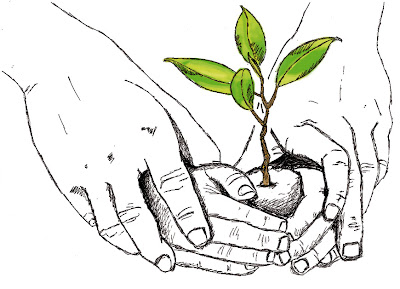Sustainable living refers to a lifestyle that attempts to reduce an individual's or society's use of the Earth's natural resources. Its also an attempt to reduce carbon footprints by altering methods of transportation, energy consumption and diet form furious consumptions to sensible choices. Sustainable and ecological living promotes living in manners that are consistent with sustainability, in natural balance and respect of humanity's symbiotic relationship with the Earth's natural ecology and cycles. The practice and general philosophy of Sustainable living is highly interrelated with the overall principles of Eco friendly development. Its also about minimizing our "ecological footprints to an extent that it dose not create an environmental impact. Proponents of Eco friendly living hope to preserve the Earth for future generations of human beings and other life.
Sustainable living branches from the concept of self-sufficiency. In recent years, its has been expressed as "development that meets the needs of the present without compromising the ability of future generations to meet their own needs. Self-sufficiency is the core principle of green living in which individuals or societies consume only that which they have produced.
Sustainable living demands environment friendly urban infrastructure in form of self sufficient design, which adheres to the principles of Eco friendly living. Its main principles are to achieve technological and governmental policies that enable urban planning for sustainable architecture and agriculture.
According to Lester R. Brown, a prominent environmentalist and founder of the World watch and Earth Policy Institutes, "Sustainable living in the 21st century is "shifting to a renewable energy-based, reuse/recycle economy with a diversified transport system."
There are many movements that oppose further mechanization of society vis-à-vis technological achievements. Eco consciousness, however, adheres to the belief that technological progress can be effectively achieved through appropriate technology.
There a many movements that may appear similar to sustainable living, which oppose further mechanization of society vis-à-vis technological achievements. Sustainable living, however, adheres to the belief that technological progress can be effectively achieved through appropriate technology.
Sunday, May 9, 2010
Concept of Sustainable Living
Thursday, April 9, 2009
Sustainable living

Sustainable living refers to a lifestyle that attempts to reduce an individual's or society's use of the Earth's natural resources. Sustainable living is an attempt to reduce carbon footprints by altering methods of transportation, energy consumption and diet form furious consumptions to sensible choices. Sustainable and ecological living promotes living in manners that are consistent with sustainability, in natural balance and respect of humanity’s symbiotic relationship with the Earth's natural ecology and cycles. The practice and general philosophy of Sustainable living is highly interrelated with the overall principles of sustainable development. Sustainable living is all about minimizing our "ecological footprints to an extent that it dose not create an environmental impact. Proponents of Sustainable living hope to preserve the Earth for future generations of human beings and other life.
Sustainable living branches from the concepts of sustainability and self-sufficiency. Sustainability, in recent years, has been expressed as "development that meets the needs of the present without compromising the ability of future generations to meet their own needs. Self-sufficiency is the core principle of Sustainable living in which individuals or societies consume only that which they have produced. It is generally a stricter ideology and practicing sustainable living in an urban world is becoming a global cause.
Sustainable living demands sustainable urban infrastructure is a form of sustainable design, which adheres to the principles of sustainable living. Its main principles are to achieve technological and governmental policies that enable urban planning for sustainable architecture and agriculture.
Sustainable living according to Lester R. Brown, a prominent environmentalist and founder of the World watch Institute and Earth Policy Institute, is “Sustainable living in the 21st century is "shifting to a renewable energy-based, reuse/recycle economy with a diversified transport system."
There a many movements that may appear similar to sustainable living, which oppose further mechanization of society vis-à-vis technological achievements. Sustainable living, however, adheres to the belief that technological progress can be effectively achieved through appropriate technology.
Blog Archive
- June (2)
- May (1)
- November (2)
- August (2)
- July (1)
- May (4)
- March (2)
- February (10)
- January (1)
- December (5)
- November (11)
- July (6)
- June (42)
- May (8)
- April (19)
- March (6)
- February (15)
- January (4)
- December (1)
- November (1)
- October (1)
- September (1)
- August (5)
- July (9)
- June (6)
- May (5)
- April (6)
- March (2)
- February (2)
